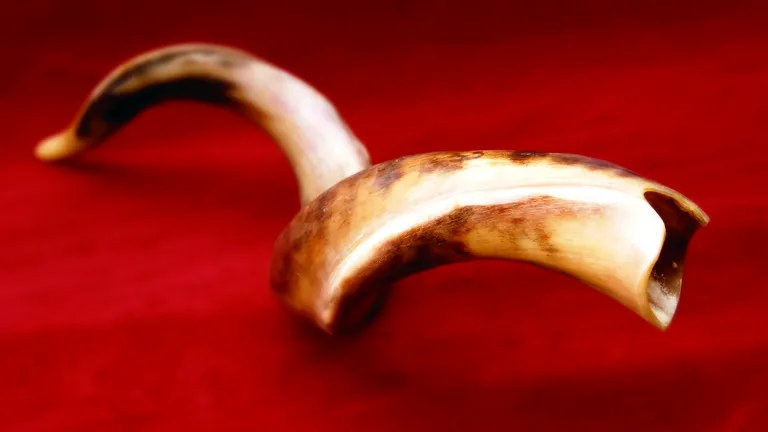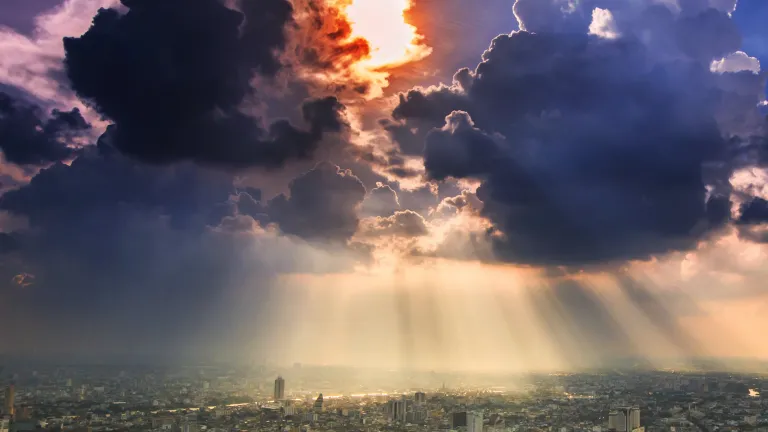The Seventh Trumpet: The Return of Jesus Christ

Paul wrote in 1 Thessalonians 4:17 about the resurrection and glorification of Christ's followers at His return. 1 Thessalonians 4:16 shows that this will occur when Christ descends from heaven with a mighty shout and the great sound of a trumpet. This is no secret event.
A parallel reference is 1 Corinthians 15:51-53, in which Paul plainly tells us that God will resurrect deceased believers to spirit at "the last trumpet." This is the same "trumpet of God" mentioned in 1 Thessalonians 4:16. Paul further states in 1 Corinthians 15:51 that God will also change believers who are still living at the time into spirit. So the return of Jesus Christ and the resurrection of the saints occur in the same time period.
What is the significance of the trumpet of which Paul wrote? The book of Revelation tells of seven trumpets sounded by seven angelic beings at the end of the age (the first six coming in chapters 8-9). The drama builds through each event announced by a trumpet blast until the seventh and final angel sounds in Revelation 11. His announcement is the finale, the last and greatest event: The return of Jesus Christ to inaugurate the Kingdom of God on earth.
"Then the seventh angel blew his trumpet, and there were loud voices in heaven, saying, 'The kingdom of the world has become the kingdom of our Lord and of his Christ, and he shall reign forever and ever!'" (Revelation 11:15, English Standard Version).
This trumpet announces the coming of divine wrath and the time of rewarding God's servants (Revelation 11:18). And combined with the other verses, it's clear that Jesus descends at the blowing of this seventh trumpet—and that this is when the saints are caught up to Him.
When does this occur in the timeline of end-time events? In a prophecy Jesus gave, He referred to a desecration in Jerusalem—the abomination of desolation—to come before the Great Tribulation (Matthew 24:15-22). This event would come 1,290 days before Daniel's resurrection at Christ's return (Daniel 12:11-13), just over 3 1⁄2 years.
Jesus continued in Matthew 24:29: "Immediately after the tribulation of those days the sun will be darkened, and the moon will not give its light; the stars will fall from heaven, and the powers of the heavens will be shaken." He said that all nations on earth would see the sign of His coming and would mourn. Then He stated that they would see Him coming with power and glory and that He would send His angels to gather His resurrected followers with a great sound of a trumpet (Matthew 24:30-31).
Compare this with Revelation 6, where we find a time of terrible final martyrdom (Revelation 6:9-11). This is followed by the heavenly signs Jesus was referring to and the people of the earth lamenting (Revelation 6:12-17). Notice the conclusion of the lament: "For the great day of His wrath has come, and who is able to stand?"
This corresponds to Joel 2:31, where we are told that "the sun shall be turned into darkness, and the moon into blood, before the coming of the great and awesome day of the Lord." That means that, in the book of Revelation, the trumpets blown after the heavenly signs represent the time of the Day of the Lord.
The seventh trumpet comes at the end of this year-long Day of the Lord—at the end of the 3 1⁄2-year period of end-time calamity. The dead in Christ are raised and living believers are changed and made immortal at this point in time. They cannot have been taken up into glory before the tribulation period. Scripture doesn't allow for a rapture of the saints to heaven for an interim of several years!
You can read more about these end-time events in our Bible study aid booklets The Book of Revelation Unveiled and You Can Understand Bible Prophecy.
Protection for the saints
We see that believers aren't taken off the earth during the Great Tribulation. But God will protect believers during this time of severe distress. The most specific reference to the protection that God promises for His people at the end of the age is in Revelation 12.
Revelation 12:14 says, "But the woman [symbolic here of spiritual Israel, the Church of God] was given two wings of a great eagle, that she might fly into the wilderness to her place, where she is nourished for a time and times and half a time, from the presence of the serpent." The times here denote years—one (time) plus two (times) plus one half (half a time), equaling 3 1⁄2 years, the period of the Great Tribulation and Day of the Lord. And note that the protection is not in heaven but in the wilderness, or the desert as it's often translated. It's on the earth, not in heaven.
There's more to the story. The context tells us that at least part of God's people will suffer persecution while God protects the rest of the faithful: "And the dragon was enraged with the woman, and he went to make war with the rest of her offspring, who keep the commandments of God and have the testimony of Jesus Christ" (Revelation 12:17). It is possible that the result of this persecution will be martyrdom.
The Bible records many ways by which God protected His people in the past, but does not reveal specifically how, where or when—or even all of the "who"—He will protect in the end. However, we can have confidence that He will reveal what we need to know at the essential time. In the meantime, our focus must be on the spiritual preparation for Christ's return and the establishment of our Father's Kingdom (Matthew 24:38-51).






